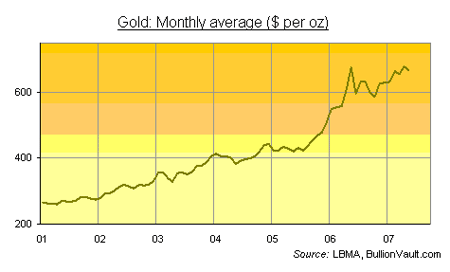Why gold's still the best bet on a weak dollar
The gold price averaged an impressive $666 in May and it's had a fantastic June so far. Meanwhile, paper currencies are scrapping over which can lose value the fastest. So why aren't investors catching on?
Get the latest financial news, insights and expert analysis from our award-winning MoneyWeek team, to help you understand what really matters when it comes to your finances.
You are now subscribed
Your newsletter sign-up was successful
Want to add more newsletters?

Twice daily
MoneyWeek
Get the latest financial news, insights and expert analysis from our award-winning MoneyWeek team, to help you understand what really matters when it comes to your finances.

Four times a week
Look After My Bills
Sign up to our free money-saving newsletter, filled with the latest news and expert advice to help you find the best tips and deals for managing your bills. Start saving today!
OIL DOWN, gold up and still the mass of investors, led by Wall Street, can't figure out what's driving this six-year bull market in bullion.
Thursday's 1.5% bounce in the gold price 'was driven by the exchange rate,' reckons Michael Widmer, head of metals research at Calyon.
'The renewed weakness in the Dollar could encourage some buying of gold overseas,' adds Stephen Platt, an analyst at Archer Financial Services in Chicago.
MoneyWeek
Subscribe to MoneyWeek today and get your first six magazine issues absolutely FREE

Sign up to Money Morning
Don't miss the latest investment and personal finances news, market analysis, plus money-saving tips with our free twice-daily newsletter
Don't miss the latest investment and personal finances news, market analysis, plus money-saving tips with our free twice-daily newsletter
Both ignore the 1% rise enjoyed by British and European gold owners today. Japanese investors have seen the metal rise 1.3% so far this week.
Gold price has fourth best month on record
And for US gold buyers? Gold bullion just completed its fourth-best month on record.
At the apocalyptic price of $666 per ounce, May's average Afternoon Fix in London was $13 shy of April's figure. But it stood 5.5% higher than January this year. It trailed the peak hit in May '06 by less than $10 per ounce.

The competition, meantime, continues to scrap over which paper promise can lose most value the fastest.
Currencies losing value fast
The Ministry of Finance in Tokyo won't allow the Bank of Japan to raise interest rates above the current 0.5%. But sensing inflation, bond investors just demanded the highest coupon on two-year Japanese government bonds in more than a decade a whole 1% per annum.
In Europe, the M3 measure of money supply rose 10.2% in April from one year before. The three-monthly average rose to 10.4%, said the European Central Bank this week the fastest rate of growth in Europe's money supply since March 1983.
Over in London, the Bank of England offers higher rates than even the almighty Dollar at 5.50%. But the interest-rate premium now priced into Sterling has failed to stall domestic inflation. Prices are rising at their fastest clip in well over 15 years. The supply of Sterling (M4) has now risen at double-digits year-on-year for the last 25 months.
Dollar bears continue the sell-off
And the US Dollar? First-quarter GDP growth came in at 0.6% less than half the Commerce Department's first and second estimates, and one-fifth of a per cent below Wall Street's average forecast. Last time the US economy grew this slowly, back at the end of 2002, the Federal Reserve was on its way to cutting interest rates down to 1% an 'emergency low' to fend off the threat of recession followed by deflation and depression.
That's why the Dollar bears merrily got back to selling the Greenback again today. But no sooner had the Euro spiked than it fell yet again; because the Fed's fears about inflation are coming true even as the economy grinds to a halt.
The Chicago Purchasing Managers Index showed prices paid by US industry rising sharply this month. The index gained 8%, in fact, a huge leap reflected by comments that 'manufacturers are using any excuse they can to increase prices' quoted by the Purchasing Managers report.
'Prices are not coming down,' adds another respondent. 'Fuel surcharges are staying the same, not lowering.'
Indeed, the only portion of the US economy that seems to be 'enjoying' lower prices right now is real estate. Countrywide, the largest mortgage lender, reported quarterly profits down 37% on Thursday. IndyMac Bancorp, a major competitor, saw its profits drop 34%.
'I don't think the housing correction is over yet,' said one economist to Bloomberg. Both S&P and Moodys reckon average home prices will drop 8% by the end of next year. Given the trouble to GDP growth that static home prices have caused so far, what might 8 in the Dollar knock off US consumer spending during the next 18 months?
'It does seem clear from yesterday's Fed minutes that the Fed is downgrading its outlook for the economy,' reckons Michael Woolfolk, currency strategist at Bank of New York, 'which is not seen returning to trend growth until 2008.'
'We could see some further Dollar weakness,' he adds and as ever, the Dollar is the United States' currency, but it's the world's problem.
Some 80% of US government bonds due to redeem in the next 3 to 10 years are now owned by foreigners, reports Lawrence Dyer, a New York- based strategist at HSBC Securities USA Inc. Alan Taylor, a professor of economic history at the University of California, says the United States has not been so beholden to overseas investors since the 19th century.
Foreign holdings of US securities have doubled since 2002, and no wonder. All those cheap Dollars that the US sends abroad to pay for its yawning trade deficit 'need to go somewhere,' as Charles Comiskey, head of US-bond trading at HSBC said earlier today 'and the natural place to go to is Treasuries.'
'Treasuries aren't bought for fundamental reasons but for necessity,' says Comiskey.
Gold is still the best hedge against a falling dollar
Anyone wanting to bet on a cheaper Dollar or simply hedge themselves against the grinding decline in all currency values might do well to avoid Euros, Sterling and Yen.
Gold remains the only world currency not open to debasement, competitive devaluation, or the excessive promises of overspent governments.
And at $666 per ounce on average right now, it also remains within spitting distance of the highs for this bull market so far.
Adrian Ash is head of research at BullionVault.com, the fastest growing gold bullion service online. Formerly head of editorial at Fleet Street Publications Ltd, he is also City correspondent for The Daily Reckoning in London, and a regular contributor to MoneyWeek magazine.
Get the latest financial news, insights and expert analysis from our award-winning MoneyWeek team, to help you understand what really matters when it comes to your finances.
Adrian has written all things gold related from if it’s worth buying, what the real price of gold should be and what’s the point of gold for MoneyWeek. He has also written for other leading money titles on his gold expertise including Business Insider, Forbes, City A.M, Yahoo Finance and What Investment Magazine. Now Adrian is head of the research desk at BullionVault, a physical market for gold and silver for private investors online.
-
 Should you buy an active ETF?
Should you buy an active ETF?ETFs are often mischaracterised as passive products, but they can be a convenient way to add active management to your portfolio
-
 Power up your pension before 5 April – easy ways to save before the tax year end
Power up your pension before 5 April – easy ways to save before the tax year endWith the end of the tax year looming, pension savers currently have a window to review and maximise what’s going into their retirement funds – we look at how
-
 Why Scotland's proposed government bonds are a terrible investment
Why Scotland's proposed government bonds are a terrible investmentOpinion Politicians in Scotland pushing for “kilts” think it will strengthen the case for independence and boost financial credibility. It's more likely to backfire
-
 How have central banks evolved in the last century – and are they still fit for purpose?
How have central banks evolved in the last century – and are they still fit for purpose?The rise to power and dominance of the central banks has been a key theme in MoneyWeek in its 25 years. Has their rule been benign?
-
 Buying vs renting: is is better to own or rent your home?
Buying vs renting: is is better to own or rent your home?The higher mortgage rates of recent years have actually made renting comparatively cheaper, analysis suggests. But there are hidden costs to long term renting.
-
 Is Britain heading for a big debt crisis?
Is Britain heading for a big debt crisis?Opinion Things are not yet as bad as some reports have claimed. But they sure aren’t rosy either, says Julian Jessop
-
 Why investors can no longer trust traditional statistical indicators
Why investors can no longer trust traditional statistical indicatorsOpinion The statistical indicators and data investors have relied on for decades are no longer fit for purpose. It's time to move on, says Helen Thomas
-
 Bank of England resolves payments issue that threatened home sales
Bank of England resolves payments issue that threatened home salesNews Homebuyers and sellers faced an anxious wait for funds to clear on property transactions today due to issues hitting the Bank's CHAPS service.
-
 How will markets react to the next Bank of England rate decision?
How will markets react to the next Bank of England rate decision?The Bank of England is due to announce its latest interest rate decision on Thursday, 2nd November, but how will markets react?
-
 Halifax: House price slump continues as prices slide for the sixth consecutive month
Halifax: House price slump continues as prices slide for the sixth consecutive monthUK house prices fell again in September as buyers returned, but the slowdown was not as fast as anticipated, latest Halifax data shows. Where are house prices falling the most?